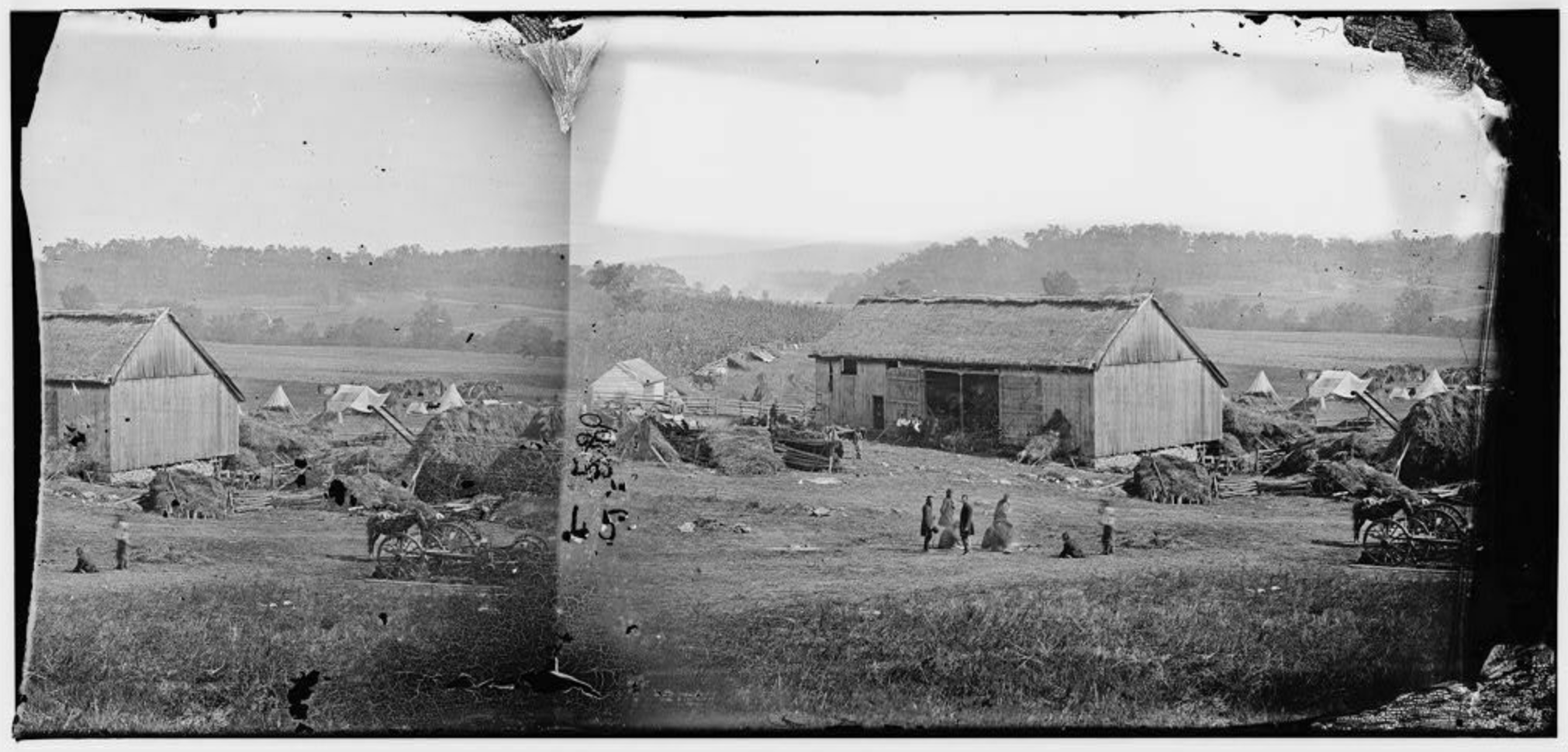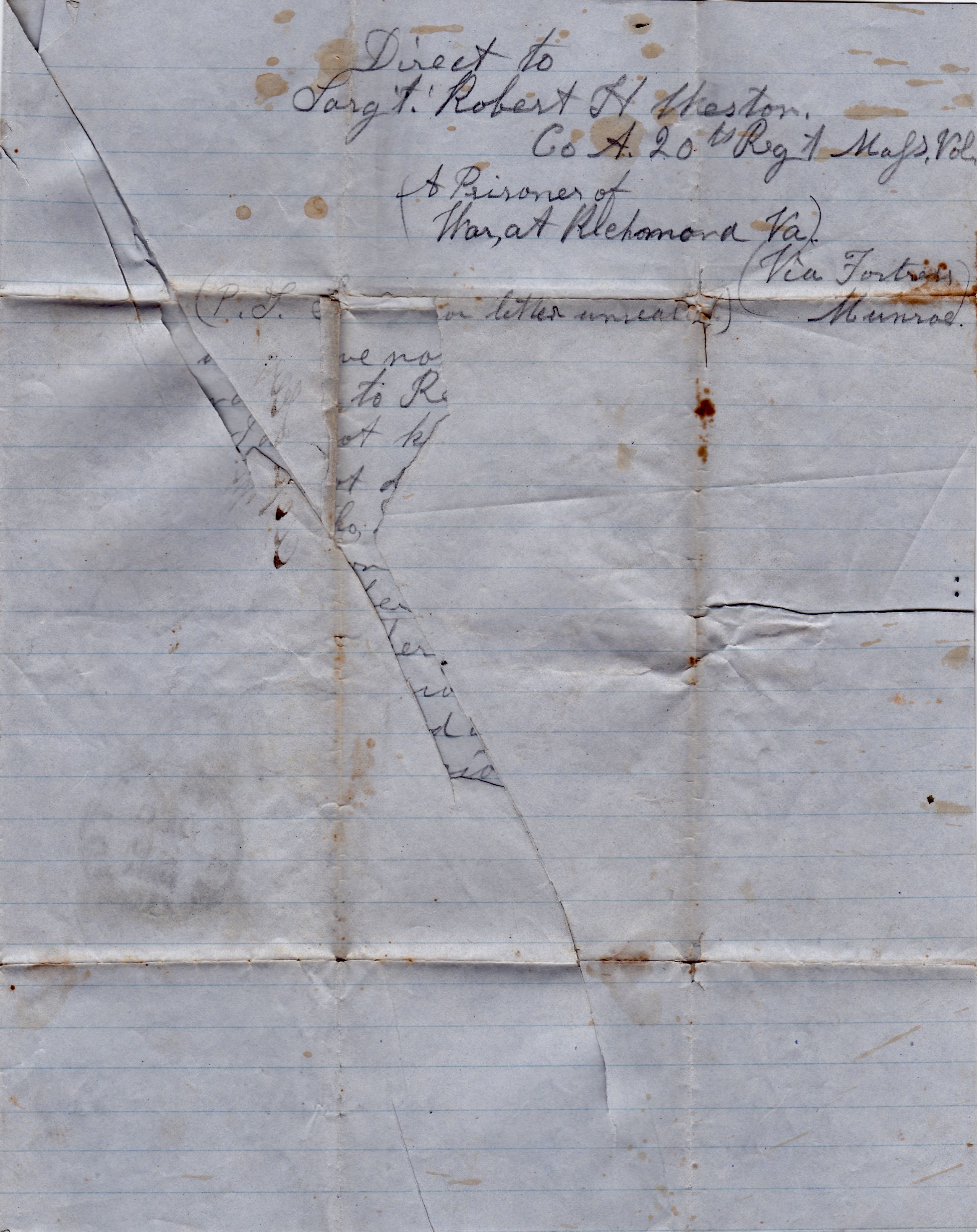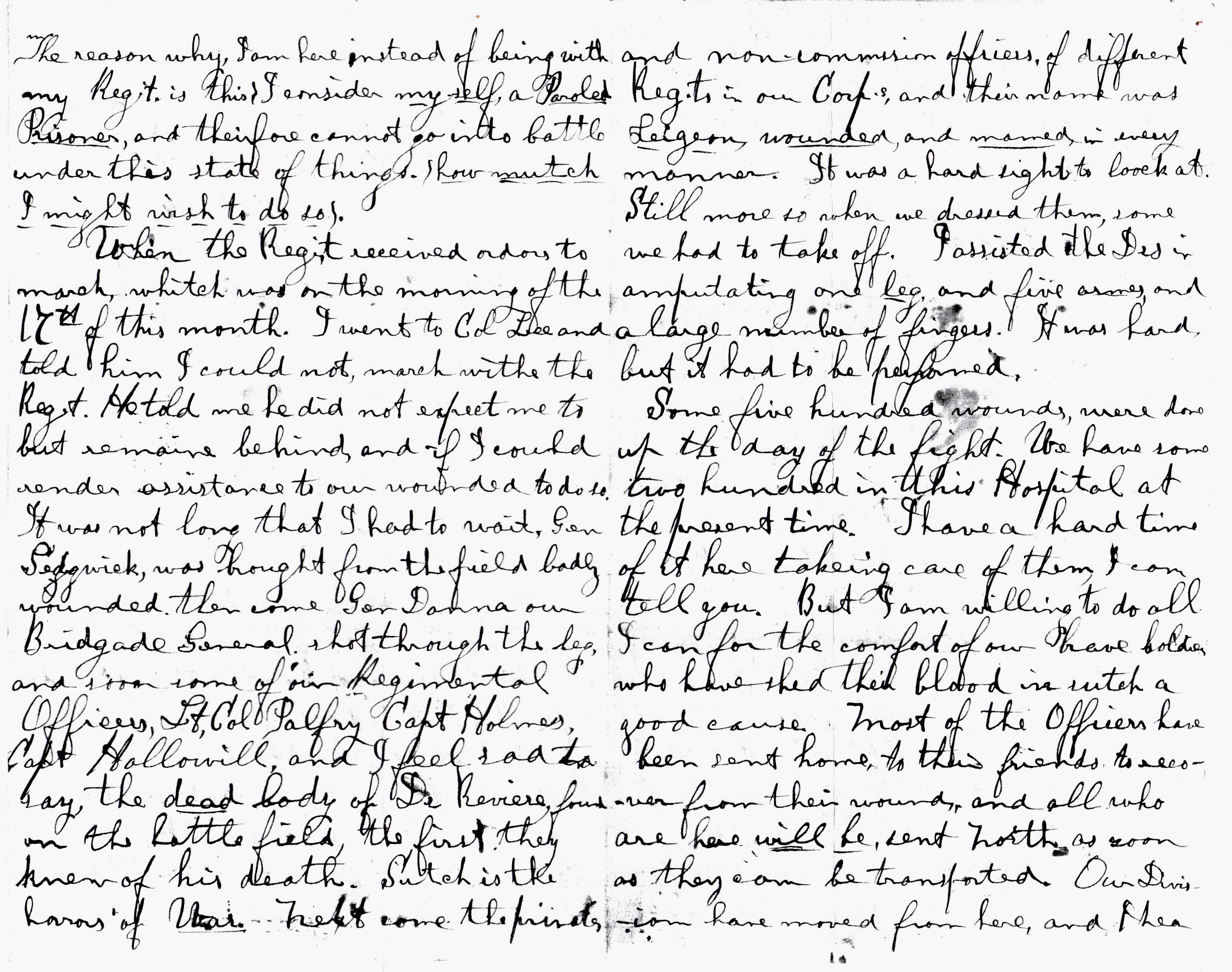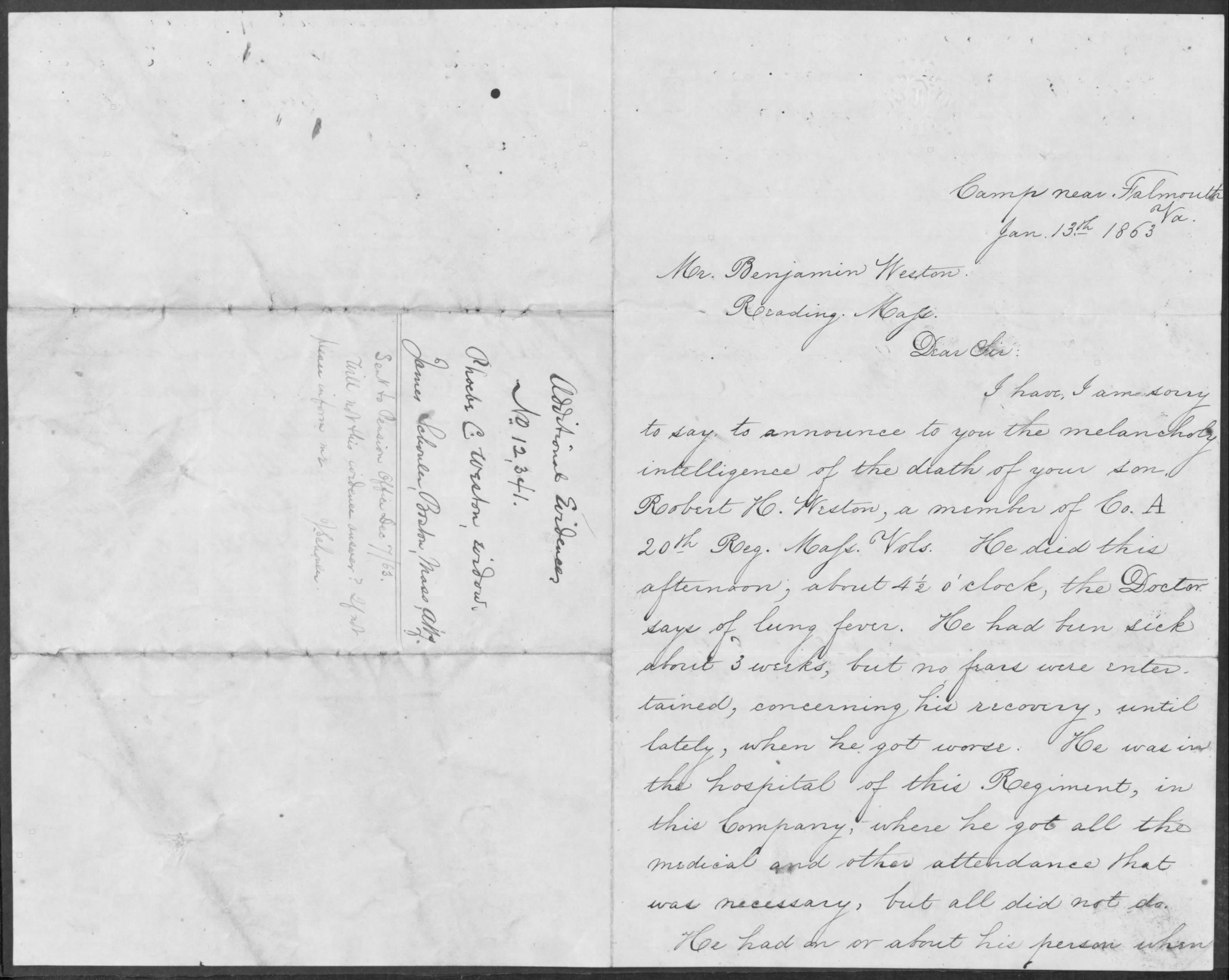
These two letters were written by Robert Henry Weston (1838-1863), the son of Benjamin Weston and Joanna Weston of Reading, Massachusetts. Robert was working as a cordwainer in Reading when he enlisted in Co. B, 5th Massachusetts Infantry on 1 May 1861. He mustered out of that regiment after three months service on 31 July 1861 but not before getting his first taste of battle at First Bull Run. Then, just days before he married Phebe Carrie Bray (1834-1908) on 27 August 1861, he enlisted in Co. A, 20th Massachusetts Infantry—sometimes called the “Harvard Regiment” because of its well-educated, socially-elite officers. While with the 20th Massachusetts, Robert once again faced the enemy at the Battle of Ball’s Bluff, a Union debacle that resulted in the death and capture of as many five hundred prisoners from the 15th and 20th Massachusetts—including Robert. The prisoners were held in Richmond until February 1862 before they were exchanged, the terms of their paroles precluding them from taking up arms against the Confederacy. Few soldiers, once released, abided by these terms, however, which seems to have relied extensively on the will of the paroled soldiers themselves to self-regulate.
It appears that Robert may have had a furlough for a few weeks after returning from prison but he was reported back at Camp Winfield Scott in April and classified as a “Returned Prisoner of War.” In September and October 1862, his military record shows him to have been reduced in rank to a private and serving as a “hospital attendant” which was the duty he was performing when he wrote the second letter—a most incredible account of the wounded from the Battle of Antietam—from Keedysville, Maryland. There is nothing more in his military record except that he died of disease (lung fever) on 13 January 1863 at Falmouth, Virginia. A letter in his pension file gives the particulars of is death (see below).
Robert addressed both of these letters to his cousin, Miss R. Jennie Weston of No. 26 Tyler Street, Boston, Massachusetts.
[Note: This letter is from the personal collection of Jim Doncaster and is published by express consent.]
Letter 1
Richmond, Virginia
Sunday Eve., December 8, 1861
My Dear Cousin Jennie,
I have wrote two letters to Phebe but have not received any answer to either—and one to Reading which has not been answered. I do not know what to think of it. As hope has not died out yet, I write a few lines to you who I know, if you receive this, will write as soon as you can and let me know how Father and her whom I left so sudden are getting along—whether they are sick or not. I feel quite anxious about all of my folks at home and I know that they will feel equally anxious about me.
I am a prisoner of war stopping at Richmond in a tobacco factory. My health is good as I can expect under the circumstances. I hope all of your folks are well. If this reaches you, please send word to Father and find out if Ward Hartsorn received my letter. It is time to go to bed so goodnight. We are treated well by the officers here but yet it is not liberty. But such is war.
Give my love to the Rowe’s. Tell them to drop a line to me. I want you to find Phebe. See if she has received my letter and write full particulars about her and all my folks.
Richmond is a very pretty place. The James river runs near our prison. Some half a mile across the river is the City of Manchester. It is a fine city. We have the limits of the yard which is attached to the building we are in in which we live, move, and have our being. We have a blanket, a bed sack filled with straw, a tin cup, breakfast at 10, Supper at 5, beef in the morning with bread and soup at night. With these we are quite comfortable. We expect some clothes. We had a few things sent us by the Col.’s [William Raymond Lee] friends of our regiment who is a prisoner here with us. I have 13 besides myself here of my company and 111 of our regiment who were made prisoners of war on the 21st of October last.
Deeming this letter sufficient for this time, I remain your affectionate but absent cousin, — Robert H. Weston
(Prisoner of War at Richmond, Va.)
Direct to Sargt. Robert H. Weston, Co. A, 20th Regt. Mass. Vols.
[Note: The following letter is in the personal collection of Chris Jordan. See comments.]
Letter 2
Sedgwick’s Division Hospital
Keedysville, Maryland
Wednesday eve, September 24th 1862
Dear Cousin Jennie,
Surrounded with the wounded soldiers of the various regiments composing our division—some who are in a fair way of recovering from their wounds received in the fight [at Antietam] of Wednesday one week ago today, and others who will struggle on for a few days, then enter that place from which none return back to this world of anguish and pain—amid these scenes I will attempt to open a few lines to inform you that my spirit has not flashed out but is alive to the wants of the wounded soldiers. At present I am acting as Hospital Steward in one of our temporary hospitals established for the comfort of our men. The reason why I am here instead of being with my regiment is that I consider myself a paroled prisoner and therefore cannot go into battle under this state of things (however much I might want to do so).
When the regiment received orders to march—which was on the morning of the 17th of this month—I went to Col. Lee and told him I could not march with the regiment. He told me he did not expect me to, but [to] remain behind and, if I could could render assistance to our wounded, to do so. It was not long that I had to wait. Gen. [John] Sedgwick ¹ was brought from the field badly wounded. Then came Gen. [Napoleon J. T.] Dana, our Brigade General, shot through the leg, and soon some of our regimental officers—Lt. Col. [Francis Winthrop] Palfrey, Capt. [Oliver Wendell] Holmes, Capt. [Norton Penrose] Hallowell, and I feel sad to say, the dead body of Dr. [Edward Hutchinson Robbins] Revere, found on the battlefield, the first they knew of his death. Such is the horror’s of war.
Next came the privates and non-commissioned officers of different regiments in our Corps, and their name was legion, wounded and maimed in every manner. It was a hard sight to look at. Still more so when we dressed them. Some we had to take off. I assisted the doctors in amputating one leg and five arms and a large number of fingers. It was hard but it had to be performed.
Some five hundred wounds were done up the day of the fight. We have some two hundred in this hospital at the present time. I have a hard time of it here taking care of them, I can tell you. But I am willing to do all I can for the comfort of our brave soldiers who have ahed their blood in such a good cause. Most of the officers have been sent home to their friends to recover from their wounds, and all who are here will be sent North as soon as they can be transported. Our Division has moved from here and now at Bolivar Heights near Harper’s Ferry. I shall remain here as long as we have a hospital here. Then I shall go perhaps to some other hospital to help take care of our wounded, I not only act as Steward but dress the worst cases and give out the medicine to those who are sick.
I do not expect to do any more fighting as I shall probably remain in some hospital. If I had a perfect right to fight, I should be with my company on the left, as guide. But I have given up my warrant as sergeant in my company [and] am now nothing but a private—pay $13 per month. But what is that so long as duty is the star which is my guide.
Oh! Jennie, when will this Unholy War be over? Would that I could look into the future and pronounce the day. I have written this letter to wile away the time as I am sitting up tonight to take care of some of our wounded. I think of home and want to be there.
How is Father? Well, I hope. I have not heard from him but once since I have been out here. And Phoebe—I at times have some sad foreboding about her living always. I may be wrong but she wrote me that she had had another attack and the folks thought at one time she could not live. Oh! Jennie, should I lose her, I believe I should welcome death in any form most. Excuse me, Jennie, for writing this. I believe I am rather wild tonight but it will soon pass off. I do not hear from hardly anyone of my friends. I almost think I am among the things that were. Write soon. Direct same as before. Love to all. Your cousin, –Robert H. Weston
¹ Major General John Sedgwick commanded the Second Division of Gen. “Bull” Sumner’s 2nd Corps at Antietam. Brig. Gen. Napoleon J. T. Dana commanded the 3rd Brigade of Sedgwick’s Division, which consisted of the 19th and 20th Massachusetts, 7th Michigan, 42nd and 59th New York.









Just to advise that the original of Weston’s Sept. 24, 1862, Keedysville letter has been in my collection since October 2009.
LikeLike